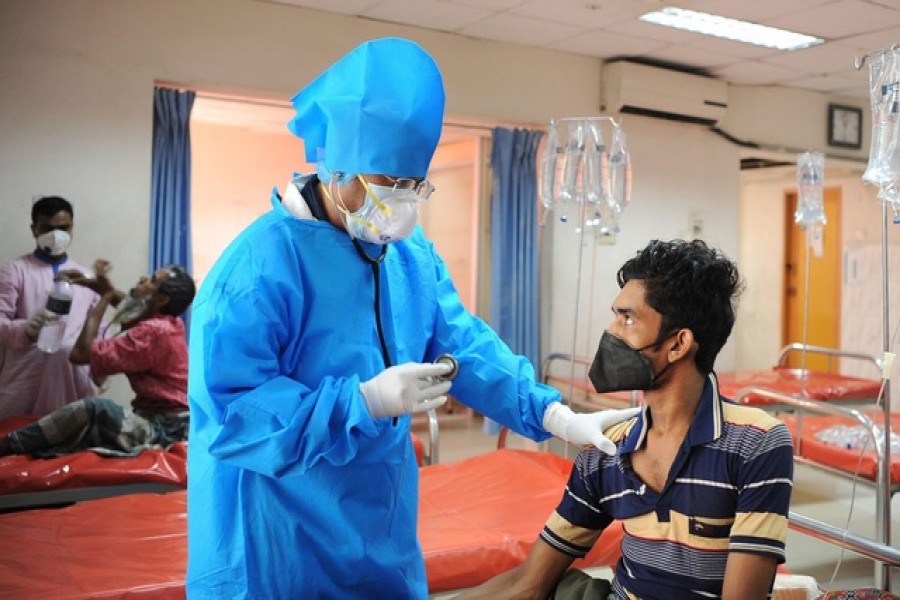South African variant became widespread in Bangladesh in mid-March: icddr,b study

Published :
Updated :

The novel variant of coronavirus first detected in South Africa became the most prevalent in Bangladesh in the third week of March, a study has found.
Researchers also found the South African variant occupied 81 per cent of the variants in Bangladesh in the fourth week of March, according to a report published on Wednesday, reports bdnews24.com.
The International Centre for Diarrhoeal Disease Research, Bangladesh or icddr,b initiated the study in December 2020 in collaboration with the government’s disease control agency IEDCR and the Directorate General of Health Services or DGHS.
Recently, the novel variants of SARS-CoV-2, especially the UK variant, B.1.1.7, South African variant, B.1.351, and Brazilian variant, P1/P2, have spread across the world.
These variants are said to have greater transmissibility and harbour new genetic changes, which may impact clinical manifestation and vaccine effectiveness, icddr,b said in the report.
The researchers tested a total of 16,265 specimens between Jan 1 and Mar 24, and 17 per cent of the samples were positive.
They identified the first UK variant on Jan 6.
However, the SARS-CoV-2 sequence database at GISAID.ORG indicated that the UK variant was already circulating in December 2020 in the country, according to the report.
The UK variant gradually increased over time until the second week of March 2021, with the highest positivity rate, 52 per cent, the report said.

The researchers observed a “dramatic change” in the distribution of variants when the South African variant appeared.
It became the most prevalent variant during the third week of March 2021 by replacing other variants, according to the study.
“Most remarkably,” it said, “the South African variant occupied 81 per cent of the variants in the fourth week of March 2021.”
“The findings warrant continuous monitoring of genetic variations of SARS?CoV?2, which is crucial for vaccine effectiveness and patients management,” it added.
Considering the recent upsurge of COVID-19, icddr,b researchers suggest everyone to follow the standard mitigation measures including wearing masks properly, washing hands, maintaining physical distance, and avoiding gatherings regardless of the previous infections, vaccination, or new variants.
The report said icddr,b encourages all to abide by the restrictions recently announced by the government.
After relatively low positivity rate in coronavirus tests for months, the pandemic took an alarming turn in the second half of March this year.
Bangladesh on Wednesday logged 7,626 new confirmed cases of the coronavirus, the highest count in a day, taking the tally to 659,278.
The death toll climbed to 9,447 after 63 fatalities were registered in the 24 hours to 8 am Wednesday, according to data released by the government.
The government revealed in the second week of March that the authorities had detected several cases of the more contagious UK variant in January.
But the IEDCR claimed the new strain had not spread in Bangladesh as all of the five to six people detected with the new variant had travelled from the UK in early January and the authorities conducted contact tracing properly.
South Africa's vaccination campaign was dealt a blow in early February when it put on hold a plan to start inoculations with AstraZeneca's vaccine, after a small trial showed it offered minimal protection against mild to moderate COVID-19 caused by the dominant local coronavirus variant.
The government then switched to the J&J vaccine in an "implementation study" to start protecting frontline healthcare workers with limited doses.
Bangladesh is also using the vaccine developed by the UK’s University of Oxford and Anglo-Swedish drugmaker AstraZeneca in mass inoculation drive with the second doses set to be rolled out on Thursday.


 For all latest news, follow The Financial Express Google News channel.
For all latest news, follow The Financial Express Google News channel.